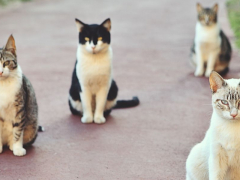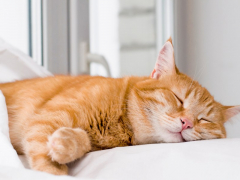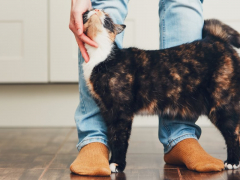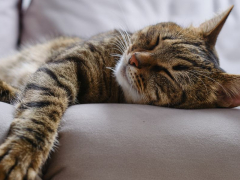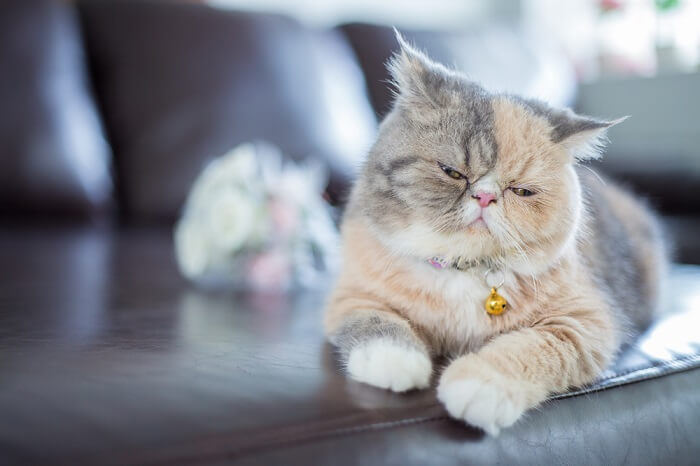
A cat with little or no energy compared to their usual behavior is a lethargic cat. There are many different causes of lethargy in cats and while sometimes lethargy can signal a behavioral issue, most of the time this is your cat’s way of telling you they are sick.
What Is Lethargy In Cats?
Lethargy is an absence or lack of energy or enthusiasm. Cats that are lethargic seem depressed, are tired or sedate, sleep more than normal, and don’t play as much as usual. They may also appear weak, be less active than they would typically be. Lethargic cats may not want to get up to use the litter box and can be sick in other ways as well.
Some lethargic cats also have a fever, an upset stomach with vomiting or diarrhea, or aren’t interested in food, water, or their favorite treats. If the lethargy has been going on for a while, they might show signs of weight loss or have muscle atrophy.
There can be varying degrees of lethargy in cats.
Some cats might be just mildly lethargic and aren’t as interested in playing or being as active as they normally are. Other cats are moderately lethargic and won’t play at all. Cats that are severely lethargic don’t even want to move and sometimes refuse to lift up their heads.
Cats are creatures who hide their illnesses as long as possible. Often, cat owners won’t know the cat has been sick for some time and when the cat finally shows symptoms of illness, the disease can be quite progressed.
Lethargy can be confusing, especially in older cats. When young active cats reach their senior or geriatric years, they tend to become slower and less active in general due to arthritis, muscle loss, and other normal aging changes.
Differences Between A Tired Cat And A Lethargic Cat
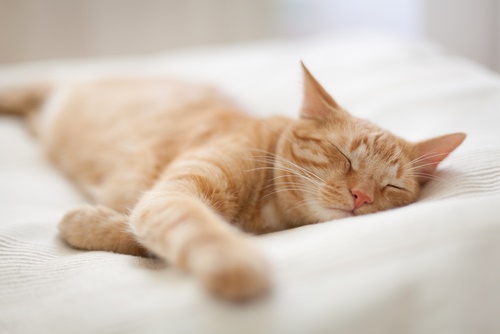
How do you know if you have a lethargic cat or just a tired one? That can be tricky, but closely watching your cat will give you the answers.
It can be difficult to determine if a cat is truly lethargic and ill or simply tired and in need of a little extra sleep.
Behaviors Of A Tired Cat
A tired cat will sleep more but once awake will play, run around, explore, and behave normally while also still eating and drinking. Tired cats are only tired for a short period of time. Once they have slept off an exciting afternoon, they are ready to bounce back to their normal day of being a curious active feline.
Behaviors Of A Lethargic Cat
A lethargic cat will have an extended period of weakness, depression, or lack of energy. Even after a nice long nap or relaxing sunbathe, these cats will continue to be tired and not as active as they normally are. Cats with lethargy are sick and typically there are other warning signs that something is wrong.
Many lethargic cats will hide in a quiet dark place such as under the bed or in a closet. They tend to prefer areas away from people and other pets.
Causes Of Lethargy In Cats
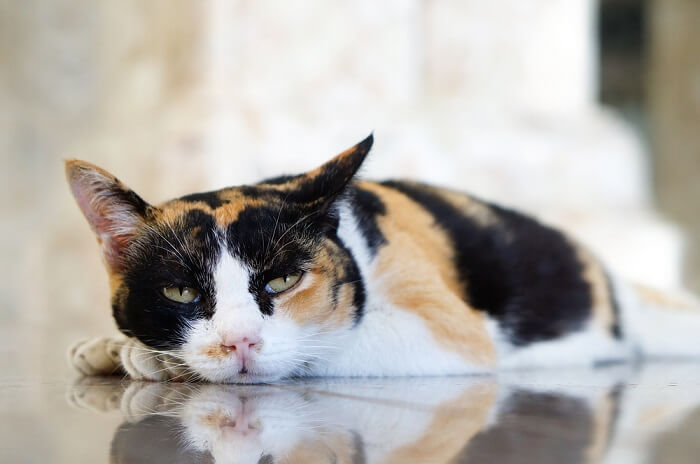
Lethargy is not a form of illness itself. Instead, it is usually a symptom of a health condition.
The list of causes for lethargy in cats is miles long. Almost any disease, illness, or injury could list lethargy as a clinical sign or symptom.
There are some causes for lethargy in cats that aren’t related to an illness or other medical condition. These causes are less common but cats experiencing them can be considered lethargic.
Non-Medical Causes Of Lethargy
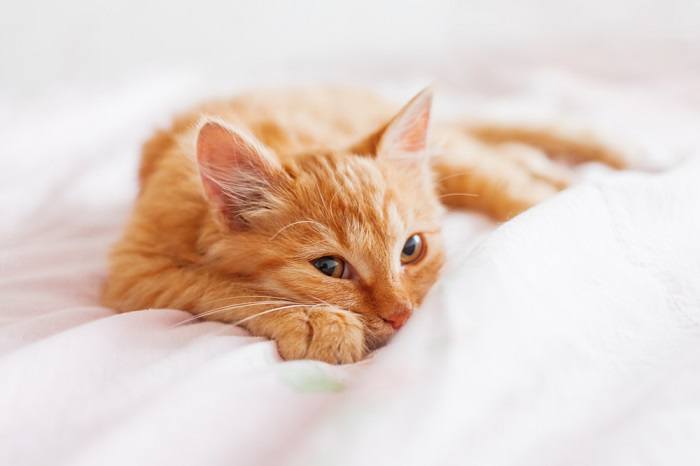
Stress And Anxiety
A cat can become stressed or anxious for many different reasons. The cat might be nervous about a change in the house or environment, they might be ill or injured, there might be a lot going on around the house, or any number of other things could cause stress or anxiety for a cat.
Also Read: 5 Visual Signs of a Stressed Cat and How to Help
To help a stressed or anxious cat, think of what might have changed around the house that could be upsetting to your cat. Provide the cat with plenty of enrichment such as toys, laser, playtime, scratching posts, cat trees, cat grass, etc.
Try veterinary recommended cat-specific pheromones or calming supplements. Remove any sources of stress that can be removed.
Changes In Environment
Changes in a cat’s environment, whether inside or outside, large or small, can be a big deal to your cat.
Loss Of A Close Pet Or Owner
It is hard for people and pets alike to lose a close family member. Some cats are affected by these kinds of losses more so than others and become inactive, depressed, or hide. Give it time and make sure the cat is still eating, drinking, and going to the bathroom normally.
Moving Homes

Moving is stressful for anyone involved, and cats are not excluded! For a cat, moving to a new home can be scary with all the new sights, smells, and noises. The cat might hide or change their behavior as they adjust.
New Owners
Similar to moving homes, moving families can be stressful and scary for cats. They may respond to this type of change by becoming less active, hiding, or showing other signs of stress or anxiety.
New Additions To The Household Such As New Babies Or Other Pets
Adding new family members to a cat’s already established circle can be stressful for the cat. Help your cat adapt slowly by introducing new family members slowly.
Boarding Or Pet Sitters
While you are away on vacation, your cat is left either in a kennel in a strange place surrounded by strange people, or in their own home being care for by someone else with a different schedule.
Cats are resilient creatures, but they also tend to be creatures of habit and changes in their environment or routine can cause changes in behavior and energy level.
Try to keep something familiar with your cat when you are away, perhaps an item of clothing or blanket that smells like you, their favorites toys or bedding, and make sure they are eating their normal diet.
Medical Reasons for Lethargy In Cats
The list of medical causes of lethargy is extensive. However, there are a few general abnormalities that are commonly seen in cats causing lethargy.
Infections
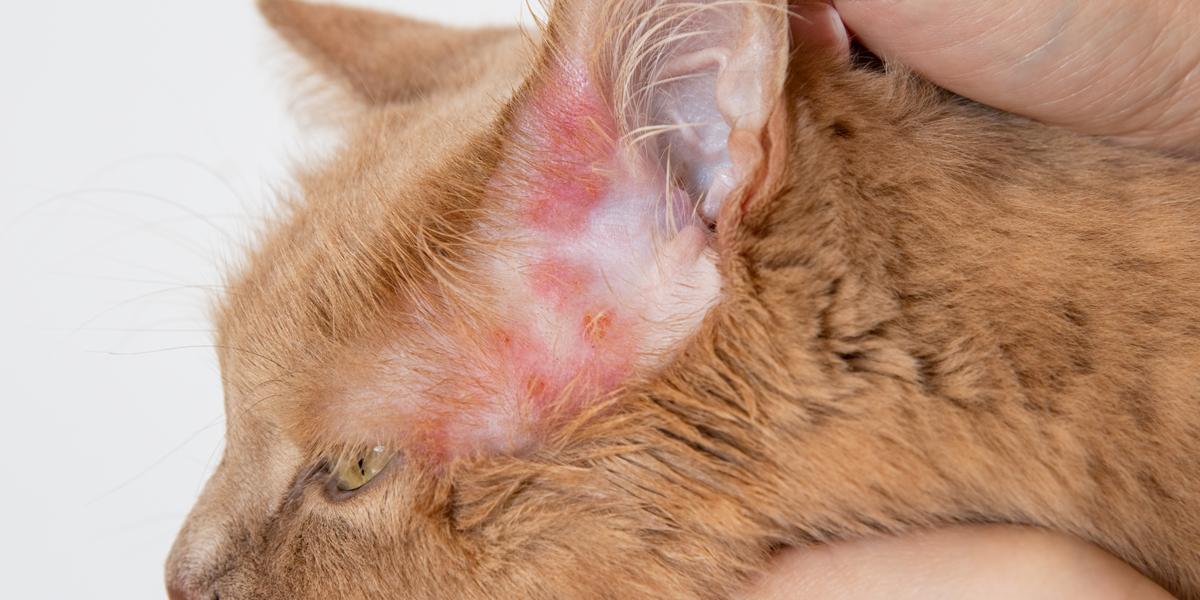
Cats can have infections in many different body systems or organs. Infections can be caused by different organisms such as bacteria, viruses, fungi, parasites, or other infectious organisms. They might have a focal infection such as an abscess or wound, or they might have a more systemic infection such as a virus.
Cats with an infection commonly have a fever and have a decreased appetite.
Cancer
Cats can suffer from a number of different types of cancers in different organs. Cancer in cats is typically seen in older cats in their senior or geriatric years.
Cats with end-stage cancer are characteristically weak, depressed, and often won’t eat or drink on their own.
Urinary Issues
There are several types of urinary tract diseases that afflict cats. Urinary tract infections, cystitis, urethral blockages, and urinary bladder stones are all lower urinary tract diseases that can cause lethargy in cats.
Pay attention to changes in your cat’s urination as a sign something is wrong.
Kidney Disease
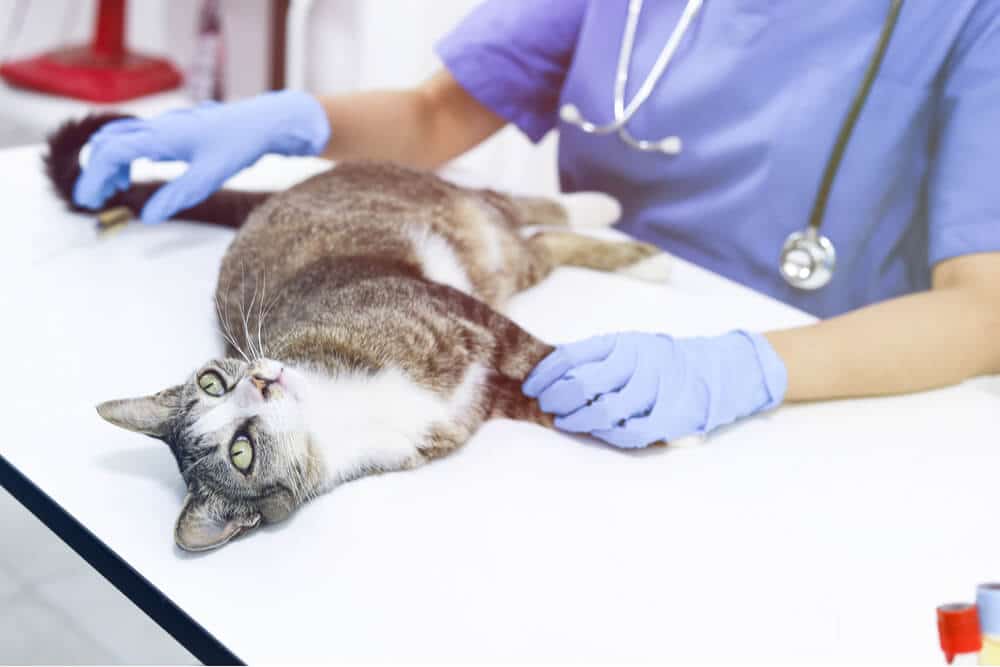
Your veterinarian can diagnose your cat with kidney failure by performing blood tests
Older cats are prone to chronic kidney disease or failure. This disease is a progressive loss of kidney function and often cats appear weak, frail, or tired and sometimes vomit, drink more than normal, or urinate more than normal.
Liver Disease
Liver and gall bladder diseases can also make cats sick and lethargic. Frequently, when cats don’t eat, they get fatty liver disease which can make them even more sick than they were to start with.
Dental Disease
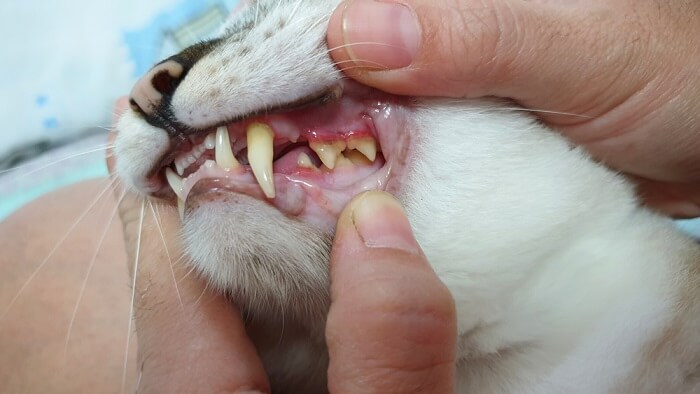
Cats accumulate more and more tartar on their teeth as they age unless they receive regular dental care. Rarely, cats will chip or break a tooth and more commonly, teeth with a significant amount of tartar can become infected causing a tooth root abscess.
Accompanying gingivitis and stomatitis can make for a painful mouth and sensitivity when eating or drinking. Cat with dental disease or infections might stop eating, become lethargic, have bad breath, have difficulty chewing, and may grind or chatter their teeth.
Neurologic Disease
There are several different neurologic diseases that can affect cats from spinal cord injuries to seizures. When a cat’s nervous system is affected, their behavior is affected as well and often they are less active than normal.
Injuries
Injured cats are almost always less active simply due to their injuries being painful and preventing them from enjoying the activities they normally enjoy.
Heart Disease
Cats commonly suffer from hypertrophic cardiomyopathy (HCM) that causes the heart muscle to become enlarged. This makes the heart work harder and can decrease a cat’s activity level.
Respiratory Disease
Diseases of the lungs such as asthma, pneumonia, or bronchitis can cause a cat to become lethargic, not interested in food, or have a fever. Cats with respiratory disease might show difficulty breathing, coughing, or exercise intolerance.
Gastrointestinal Disease
Cats with diseases of the gastrointestinal tract are often sick and depressed especially if they have been sick for a while.
Commonly, these cats don’t eat as much as they used to and sometimes after eating get sick. They also lose weight, vomit, have diarrhea, and sometimes more hairballs than usual.
Systemic Disease
There are several diseases that can affect a cat in general making them ill. Anemia, autoimmune disease, and viral infections are some health problems that can cause lethargy.
What To Do If Your Cat Is Lethargic?
If you notice that your cat is laying around more than normal, not playing when they normally do, seems depressed or tired, or is otherwise showing signs of illness, you should contact your veterinarian right away for an appointment to have your cat examined.
After a thorough history discussing your cat’s health and habits and a full physical exam, the vet might recommend diagnostic tests such as bloodwork or X-rays to determine the cause of lethargy.
If the lethargy comes on suddenly, continues to get worse, or doesn’t resolve on its own, then you should visit a veterinarian immediately.
It is very important to know what is normal for your cat so you can compare that to any changes you observe in their behavior.
Knowing your cat’s normal behavior will also help you can answer questions when your veterinarian asks you for history during your cat’s checkup.
Once you notice that your cat is lethargic, ensure that there is a quiet dark place for it to rest away from the hustle and bustle of the household.
Offer fresh food and water to encourage appetite. Try canned food if the cat doesn’t want the dry kibble.
Conclusion
As you can see, there are many causes of lethargy in cats. The bottom line is to know what is normal and abnormal for your individual cat and seek veterinary care once you notice your cat is acting abnormally.
Frequently Asked Questions
What does lethargic mean in cats?
Lethargy in cats is a lack of energy and loss of interest for the activities they normally enjoy.
Is my cat sick or just tired?
A sick cat will continue to be lethargic, not eat, and act sick without improvement while a tired cat should resume its normal activity once it has slept.
How long does cat lethargy last?
The length of illness in cats can vary from days to months depending on what the cat is suffering from.




